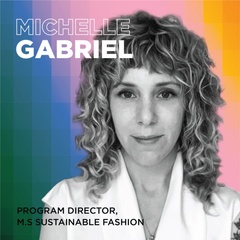
Fall 2024 Sustainable Fashion Strategy Course
Fall 2024 Sustainable Fashion Strategy Course
- Home
- Fall 2024 Sustainable Fashion Strategy Course
Sustainable Fashion Strategy
Sustainable Fashion Strategy
This course covers the range of considerations specific to operating with a common good lens but general to every fashion business, focusing on product creation including designing for reduced impact, material sourcing for sustainability and ethics, supply chain considerations, tools and metrics by which to manage sustainability/ethics/impact in your business, brand voice and impact messaging, circular economy considerations, risk management, positive impact opportunities, best business structures for positive impact, and shifting stakeholder perspectives. Through readings, lectures, field trips, class discussion, guest speakers, and development of a sustainability focused organizational strategy, students will develop the tool set needed to function at any level of a business – from independent contributor to CEO – to support positive impact and greater systems change.
Course is fully online with synchronous classes via Zoom. Classes begin Tuesday, September 10 and run through Tuesday, December 3, 2024 from 6-9:30pm ET.
Register now for fall 2024
Register now for fall 2024
- 12 Weeks
- 3 Credits
- Course Fees: $1000
- No Prerequisites
- Classes Start September 2024

Tuition
Tuition
Fee: $1000
Fee: $1000
*This represents a significant savings from the normal rate of over $3000 for a 3 credit course.
Program Structure
Program Structure
- 1
Program Structure
Built for working professionals, this Instructo...
Read more > - 2
Past Guest Speakers Include
- Maxine Bedat, Author of ...
Read more >
Meet the Course Faculty
Meet the Course Faculty
This course is taught by GCNYC Program Director, M.S. in Sustainable Fashion Michelle Gabriel.
Michelle Gabriel is an educator, researcher, social impact and fashion sustainability strategist who speaks widely about the systems, strategies, policies and laws needed to establish widespread sustainable practices in the fashion industry. Her research investigating how value perceptions in the fashion system are shaped and built through cultural and economic systems aims to drive more equitable dynamics across societies. She is a PhD candidate at the Yunus Centre for Social Business and Health at Glasgow Caledonian University in Glasgow, Scotland.
Read Michelle’s recent Teen Vogue op-ed Climate Change Is Still Overlooked in Fashion Schools. It’s Time to Change That or academic publications .
Linked in
Course Curriculum
Course Curriculum
Week 1: September 10, 2024
Theme: Shared Understanding
- Sustainability, strategy & fashion
- Sustainable fashion & systems theory
- Why the fashion industry needs sustainability
- Fashion industry utopia
Week 2: September 17, 2024
Theme: Understanding the Fashion System
- Fashion industry landscape & history
- Qualities of the fashion system
Week 3: September 24, 2024
Theme: Understanding the Fashion System
- Fashion industry structure & stakeholders
- Fashion industry competitive landscape
- The role of innovation
Week 4: October 1, 2024
Theme: Understanding the Fashion System
- The global fashion supply chain & structure
- Supply chain stakeholders
- Supply chain vs value chain
Week 5: October 8, 2024
Theme: Understanding the Fashion System
- How fashion and the fashion industry are effective & ineffective
- Current status: Sustainability
- Structural limitations
Week 6: October 15, 2024
Theme: Fashion Economics
- Economic sustainability
- How is value created?
- Fashion & capitalism
- Veblen and fashion economics
- Externalities
Week 7: October 22, 2024
Theme: Fashion Impact Areas
- Engaging stakeholders
- Business case for stakeholder engagement
- Human sustainability in the fashion system
- Environmental sustainability in the fashion system
Week 8: October 29, 2024
Theme: Fashion Impact Areas
- Scale & scope of issues
- Fashion innovation challenges
Week 9: November 5, 2024
Theme: Tools for Systems Change
- Changing the purpose of the fashion system
- Mission and core values
- Impact business model options
- Redefining fashion
- The role of policy
Week 10: November 12, 2024
Theme: Feedback Loops
- Consumer and corporation power
- Overproduction & overconsumption
- Selling & marketing Sustainably
Week 11: November 19, 2024
Theme: Feedback Loops
- Fashion’s image and inclusion problem
- Representation
- Exclusion structures
Week 12: December 3, 2024
Theme: Moving Forward
- Building alternative fashion systems
- The evolving role of the fashion industry
- Rightsizing and degrowth

